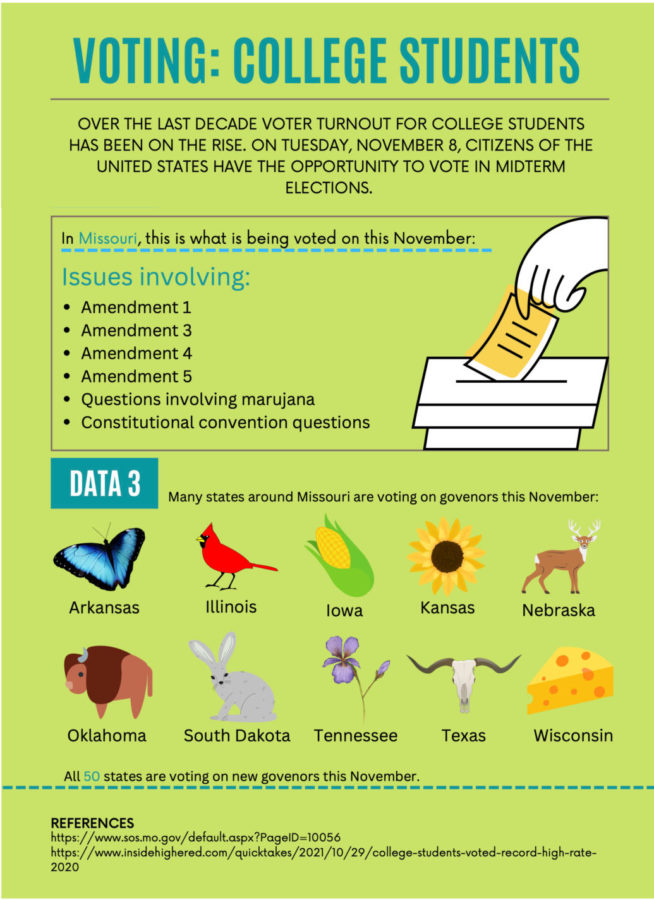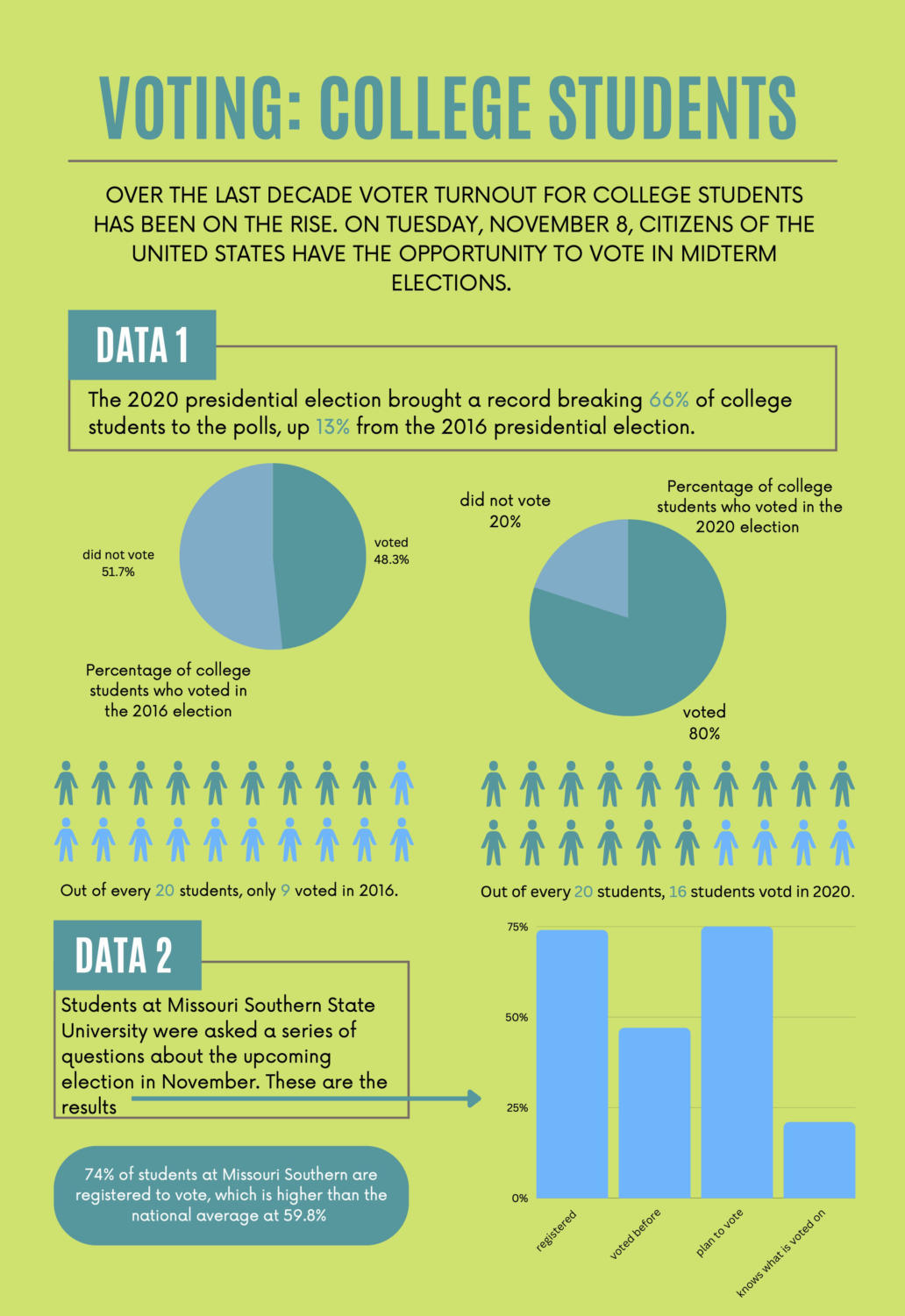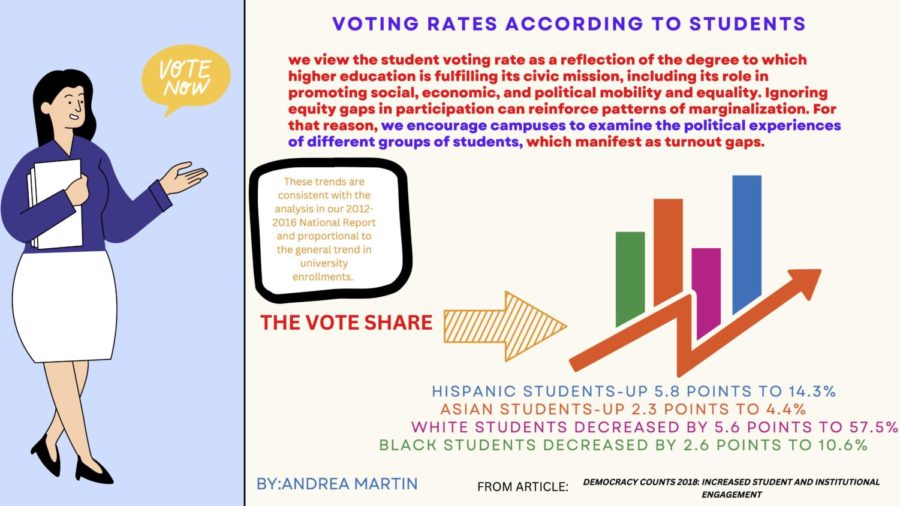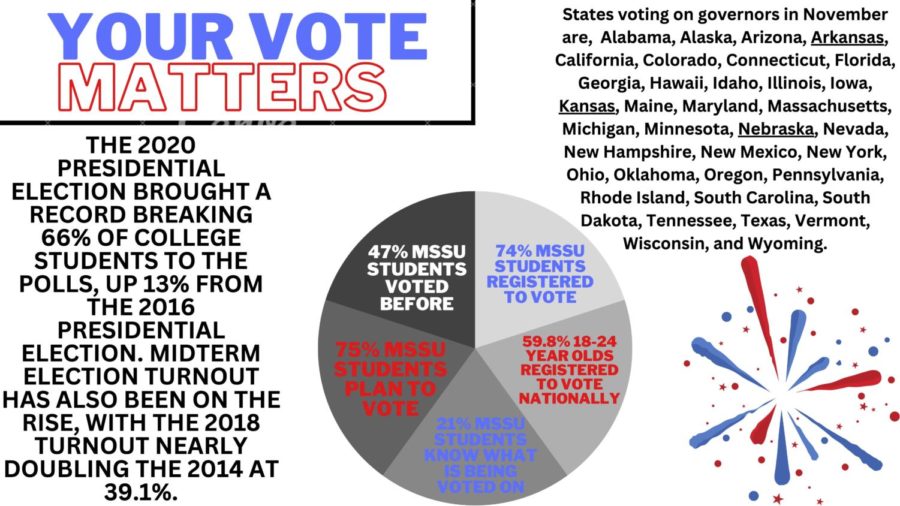Your donation will support the student journalists of Missouri Southern State University. Your contribution will allow us to purchase equipment and cover our annual website hosting costs.
A guide for the midterm elections
October 25, 2022
Prepare for the polls

Over the last decade voter turnout for college students has been on the rise. On Tuesday, Nov. 8, citizens of the United States have the opportunity to vote in midterm elections.
The 2020 presidential election brought a record-breaking 66% of college students to the polls, up 13% from the 2016 presidential election. Midterm election turnout has also been on the rise, with the 2018 turnout nearly doubling 2014 at 39.1%. So, what can we expect to see in these upcoming midterms from Missouri Southern students, as well as students nationwide.
Over the last week, we conducted a survey of Missouri Southern students and asked them these four questions. Are you registered to vote? Have you ever voted before? Do you plan on voting in the upcoming November election? Do you know what we will be voting on in November?
74% of students at MSSU reported being registered to vote, which is significantly higher than the national average for 18-24 year olds, at 59.8%. 47% of students surveyed reported having voted in previous elections, and 75% expressed plans to vote in November. Only 21%, however, knew what was being voted on.
Midterms are the elections held halfway through a presidential term. In midterm elections, all 50 states vote on seats for the House of Representatives. In this election cycle 34 Senate seats will also be voted on, including seats in Missouri, Kansas, Arkansas and Oklahoma.
In midterm election years some states also hold their governor elections. States voting on governors in November: Alabama, Alaska, Arizona, Arkansas, California, Colorado, Connecticut, Florida, Georgia, Hawaii, Idaho, Illinois, Iowa, Kansas, Maine, Maryland, Massachusetts, Michigan, Minnesota, Nebraska, Nevada, New Hampshire, New Mexico, New York, Ohio, Oklahoma, Oregon, Pennsylvania, Rhode Island, South Carolina, South Dakota, Tennessee, Texas, Vermont, Wisconsin, and Wyoming.
In order to find out what your state will be voting on in November, you can check your state’s website, the link for citizens of Missouri is here.
Why students should vote
Opinion
Growing up, I’ve always heard, “your vote matters because you’re choosing the future of our country.”
But that reasoning meant nothing to me when I learned about the electoral college. Therefore, my perspective shifted from “I can change the world” to “why should I vote when only the electoral college votes matter?”

With Missouri’s midterm election just days away, students may realize that they know nothing about voting. After conducting a survey and talking to students, I realized that most Missouri Southern students don’t know who they’re voting for, or what issues they’re voting on. Honestly, some didn’t even realize that there is an election this November.
Contrary to what I believed, voting really does matter. So while most just participate in presidential elections, it’s really the state and local elections that are significant.
In 2018, midterm elections saw a record-breaking number of people at the polls in over 100 years, according to pewresearch.org. 68% of those voters said that part of the reason they voted is that they believe that the political party that controls Congress matters.
This year all states will vote on representatives, 36 states will vote on governors, and 34 states will vote on Senators along with various local office positions. These positions are key to determining solutions regarding schools, police, budgeting, minimum wage, laws, etc.
The elected officials in midterm elections can decide things such as LGBTQ+ rights, gun safety, climate change and more. These decisions can change your everyday life. For example, with abortion, state officials get the opportunity to decide whether they choose to enact anti-abortion laws, or allow it.
You should vote this November to support officials that reinforce your beliefs. This is the first step in seeing changes in the community that you care about. Voting also gives you the feeling of civic pride that you can carry with you for years to follow.
We are privileged as a society to have the opportunity to partake in a democracy. So ultimately, the answer is yes, you should vote. You’ll even get a sticker!
How to register for mail-in ballots
For students, voting while still in school can be difficult. Some may be across the country, or just not in the right district of their state to vote. This can cause students to not want to vote, or to feel like they can’t.
Absentee ballots, also called mail-in ballots, are a key element for many college students when it comes to exercising their civic right to vote.
The Missouri Secretary of State’s webpage lays out the process, and options for citizens of the state to vote absentee.
To avoid your ballot being thrown out, it is important to remember to include the necessary documents.
The first option given is a “no-excuse absentee ballot”, using this method, you may request to vote in person at a location determined by a local authority within two weeks of the set election date.
Students may also request a mail-in absentee ballot. If they have not voted in person before, they must first be registered by mail, before requesting a ballot. Once completed, the ballot has to be mailed or faxed, to the correct election authority before 5 p.m. on the second Wednesday before the election.
The Missouri Secretary of State’s office provides this list giving reasons which are deemed acceptable for voting absentee.
- Absence on Election Day from the jurisdiction of the election authority in which such voter is registered to vote;
- Incapacity or confinement due to illness or physical disability on election day, including a person who is primarily responsible for the physical care of a person who is incapacitated or confined due to illness or disability and resides at the same address;
- Religious belief or practice;
- Employment as an election authority or by an election authority at a location other than such voter’s polling place, a first responder, a health care worker, or a member of law enforcement;
- Incarceration, provided all qualifications for voting are retained.
- Certified participation in the address confidentiality program established under sections 589.660 to 589.681 because of safety concerns.
- To avoid your ballot being thrown out, it is important to remember to include the necessary documents.
For first time, by mail voters, it is required to submit a copy of their personal identification, unless they provide a copy with their registration papers. Acceptable forms of identification include
“A non-expired Missouri driver or non-driver license; A non-expired military ID, including a veteran’s ID card; A non-expired United States passport; or another photo ID issued by the United States or the state of Missouri which is either not expired or expired after the date of the most recent general election.”
Another resource students from any state can access is provided by vote.org. This tool helps people request ballots from any state. For more help requesting absentee ballots, you can also look up your state’s secretary of state, and find state-specific information on their website.
A councilman’s perspective on voting
Students at Missouri Southern expressed their confusion about voting. Students wanted to know what to expect when voting and what would be on the ballot for midterm elections.
Josh DeTar was elected as a Joplin city councilman on April 5, 2022. Because of his position, DeTar relies on voting and the election process to be voted into office.
“You have to ask people to vote for you,” DeTar said when speaking about running for councilman. “You vote for people you feel are going to represent you… and your ideas and your thoughts the best.”
Statistics show a common voting age gap across most countries. For the 2016 Presidential election, less than half of young Americans ages 18-29 voted. According to the New York Times, habit formation, opportunity cost and alternative participation explained the voting gap.
Habit formation refers to either being in the habit of voting regularly versus not being in that habit. Since young voters may not have much experience voting, it can make them hesitant to start. Opportunity cost in this instance, refers to young adults not having the job flexibility or financial cushion to take off so they can vote. Lastly, alternative participation refers to the younger generation’s participation in other forms of political action, such as protests and social media movements.
Not voting is giving up your chance to have your voice heard — Josh DeTar, Joplin city councilman
According to DeTar, voting for local government affects daily life more than a federal election. In fact, local elections can create solutions for concerns such as road conditions, drinking water, parks, and city economics which then can affect what businesses, restaurants and stores come to the Joplin area.
In addition, local elections determine positions such as mayor, council members, school board members, county commissioners, etc (depending on county or city). Those positions also manage citizens and students to create a functioning society.
DeTar voted for the first time when he was 18 years old. He experienced voter anxiety back then as a young adult and even now.
“It’s intimidating even as an adult because the language that’s on the ballots is hard to understand,” DeTar said.
To conquer voter anxiety, DeTar advises researching candidates and issues. This can be done by watching city council meetings, reviewing the local paper or online sources. Sample ballots are also available by going online and searching your county’s sample ballot. Most counties will have a website where you can find a link to view the candidates and issues.
The upcoming election is a midterm election, which occurs in the middle of a presidential term election in November. Votes will be cast for state congressmen, state representatives in the Missouri House, Missouri State senators, Missouri US senators and representatives. Also this year a big headline has been if voters will also decide to legalize recreational marijuana.
Aside from big, controversial topics, getting voters motivated can be a challenge.
“The city’s responsibility is [that] we can’t advocate,” DeTar said.
Joplin can only encourage voting in general but cannot promote or lean toward a particular candidate or a particular side. Some candidates will use social media as well to reach their supporters and motivate them to vote.
Voting can change the scope of cities, states and the entire United States. It all starts with the small, local elections and builds upwards to presidential elections.
“Not voting is giving up your chance to have your voice heard,” DeTar said. “You walk out feeling empowered.”


